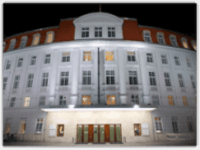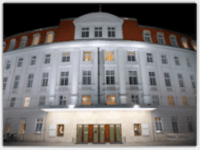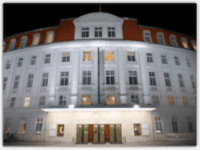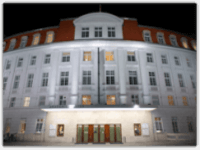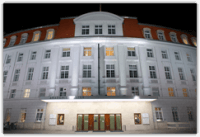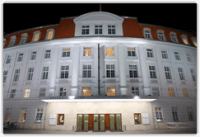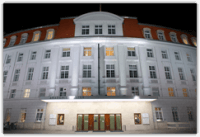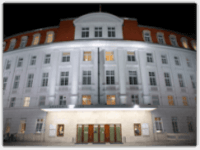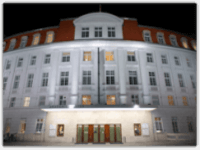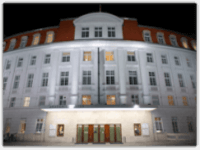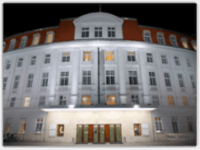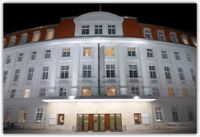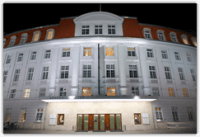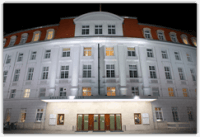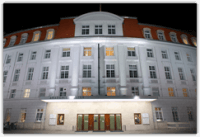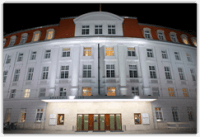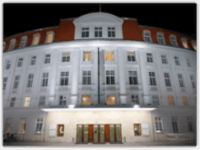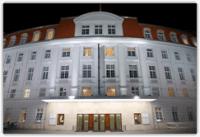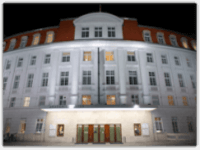Dorian Gray succumbs to the desire for eternal youth after Lord Henry, a harbinger of today's selfishness, instills his hedonistic maxims into his head. The wish comes true in a magical way: from that day on, Dorian never ages anymore and thus becomes a living picture at the height of his youthful beauty, while the portrait that his friend Basil painted of him is marked more and more deeply by the progress of life becomes.
03
Fr 20:00
Der einsame Westen
Martin McDonagh
Martin McDonagh
- Not available -
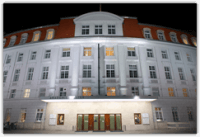
Martin McDonagh German by Martin Molitor and Christian Seltmann
Director Lucia Bihler translates this iconic parable into a series of transformation phases that address questions about loneliness, loss of trust, powerlessness and the urge to survive in today's world. In this way, she approaches the story of the modern prodigy Franz Kafka, who was born in Prague in 1883 and died in Kierling, near Vienna, in 1924, a century ago, in a pictorial, very physical way.
Goethe wrote the first version of his humanistic drama as a secret legion councilor on a trip to recruit recruits for the Weimar army. Even today, his call for dialogue and justice is far removed from everyday political reality. But Goethe suggests how the world-determining pendulum movement between murder and retaliation could be ended and counters the cycle of violence with the possibility of a processual change in the world.
06
Mo 20:00
Die Verwandlung
nach Franz Kafka
nach Franz Kafka
- Not available -
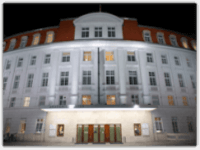
Director Lucia Bihler translates this iconic parable into a series of transformation phases that address questions about loneliness, loss of trust, powerlessness and the urge to survive in today's world. In this way, she approaches the story of the modern prodigy Franz Kafka, who was born in Prague in 1883 and died in Kierling, near Vienna, in 1924, a century ago, in a pictorial, very physical way.
Goethe wrote the first version of his humanistic drama as a secret legion councilor on a trip to recruit recruits for the Weimar army. Even today, his call for dialogue and justice is far removed from everyday political reality. But Goethe suggests how the world-determining pendulum movement between murder and retaliation could be ended and counters the cycle of violence with the possibility of a processual change in the world.
Der eigenbrötlerische Provinzbürger Adam verhindert gerade rechtzeitig, dass sich die unbekannte Eva in einem Teich das Leben nimmt. Er bringt sie ins Automatenbüfett, ein von seiner Gattin geführtes Restaurant, wo Speisen, Getränke und auch Musik auf Knopfdruck bestellt werden können. Unter der strengen Obhut Frau Adams treffen sich hier die Honoratioren der Stadt. Die Fremde entfacht sogleich die Fantasie der Männerrunde, und so wird es mit Evas Unterstützung für Adam ein leichtes Spiel, seine visionären Pläne zum Aufbau der Fischzucht-Industrie umzusetzen
...
...
13
Mo 20:00
Die Verwandlung
nach Franz Kafka
nach Franz Kafka
- Not available -

Director Lucia Bihler translates this iconic parable into a series of transformation phases that address questions about loneliness, loss of trust, powerlessness and the urge to survive in today's world. In this way, she approaches the story of the modern prodigy Franz Kafka, who was born in Prague in 1883 and died in Kierling, near Vienna, in 1924, a century ago, in a pictorial, very physical way.
The parable-like story of the Grand Inquisitor occupies a special place in Fyodor Dostoyevsky's monumental late work THE BROTHERS KARAMAZOW. This is set in 16th century Spain and is about the return of Jesus Christ, who threatens to become a victim of the Inquisition carried out in his name. The Grand Inquisitor's monological speech, which deals with ethical-moral and religious-philosophical problems, will be brought to the stage of the Academy Theater by Barbara Petritsch...
16
Th 20:00
Die Traumdeutung von Sigmund Freud
Dead Centre
Dead Centre
- Not available -
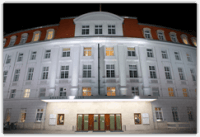
Ein Buch wie ein Traum, so wegweisend wie umstritten . Sigmund Freuds Großprojekt ist ebenso undurchdringlich wie die Seele, die es untersucht. Ein konfuser Wegweiser zu den Schauplätzen der Träume und damit zum Ich, wovon Träume laut Freud ausschliesslich handeln.
...
...
Director Lucia Bihler translates this iconic parable into a series of transformation phases that address questions about loneliness, loss of trust, powerlessness and the urge to survive in today's world. In this way, she approaches the story of the modern prodigy Franz Kafka, who was born in Prague in 1883 and died in Kierling, near Vienna, in 1924, a century ago, in a pictorial, very physical way.
Goethe wrote the first version of his humanistic drama as a secret legion councilor on a trip to recruit recruits for the Weimar army. Even today, his call for dialogue and justice is far removed from everyday political reality. But Goethe suggests how the world-determining pendulum movement between murder and retaliation could be ended and counters the cycle of violence with the possibility of a processual change in the world.
The successful and wealthy fashion designer Petra von Kant finds herself in a life crisis after her second marriage broke up. The taciturn Marlene, who is humiliated and exploited by Petra, lives and works at her side. Petra met the young model Karin Thimm through a friend, started a relationship with her and protected her career...
22
We 20:00
Der Raub der Sabinerinnen
Schwank in vier Akten Franz und Paul von Schönthan in einer Fassung von Svenja Viola Bungarten & Anita Vulesica
Schwank in vier Akten Franz und Paul von Schönthan in einer Fassung von Svenja Viola Bungarten & Anita Vulesica
Professor Gollwitz, a small-town high school professor struggling with financial and domestic worries, has succumbed to his secret passion for theater. When the theater director Striese happened to be visiting the city with his traveling theater troupe, he found out that the professor was hiding the play THE ROBBER OF THE SABINE WOMEN in a drawer from his wife. The Schreientheater director Striese, who is quick-witted in all situations, elicits the stroke of genius from the author, who initially refuses, and prepares its performance. Before the play sees the light of day, the professor's wife returns unexpectedly from the spa, and the family catastrophe with impending embarrassment takes its course.
Goethe wrote the first version of his humanistic drama as a secret legion councilor on a trip to recruit recruits for the Weimar army. Even today, his call for dialogue and justice is far removed from everyday political reality. But Goethe suggests how the world-determining pendulum movement between murder and retaliation could be ended and counters the cycle of violence with the possibility of a processual change in the world.
Director Lucia Bihler translates this iconic parable into a series of transformation phases that address questions about loneliness, loss of trust, powerlessness and the urge to survive in today's world. In this way, she approaches the story of the modern prodigy Franz Kafka, who was born in Prague in 1883 and died in Kierling, near Vienna, in 1924, a century ago, in a pictorial, very physical way.
Goethe wrote the first version of his humanistic drama as a secret legion councilor on a trip to recruit recruits for the Weimar army. Even today, his call for dialogue and justice is far removed from everyday political reality. But Goethe suggests how the world-determining pendulum movement between murder and retaliation could be ended and counters the cycle of violence with the possibility of a processual change in the world.
In einem Jagdhaus, fernab der Stadt, inmitten eines Zuchtwalds von gigantischen Ausmaßen, warten die Generalin und der Schriftsteller auf die Ankunft des Generals: ein stolzer Stalingrad-Veteran, Großgrundbesitzer, Jäger und ranghoher Politiker auf dem Höhepunkt seiner Macht. Es schneit, und der Bedienstete Asamer heizt ein gegen die winterliche Kälte. Das Gespräch der Generalin mit dem Dichter kreist um den Finalzustand, in dem sich der alte General und dessen Welt entgegen dem Anschein tatsächlich befinden.
...
...
The two dandies Algernon and Jack love the double life. In order to reconcile vice and pleasure with their social obligations, both of them have made up lies: Algernon invents a sick friend named Bunbury so that he can visit him in the country as often as possible, and Jack pretends to take care of his brother Ernst having to come to town regularly.
Dorian Gray succumbs to the desire for eternal youth after Lord Henry, a harbinger of today's selfishness, instills his hedonistic maxims into his head. The wish comes true in a magical way: from that day on, Dorian never ages anymore and thus becomes a living picture at the height of his youthful beauty, while the portrait that his friend Basil painted of him is marked more and more deeply by the progress of life becomes.
